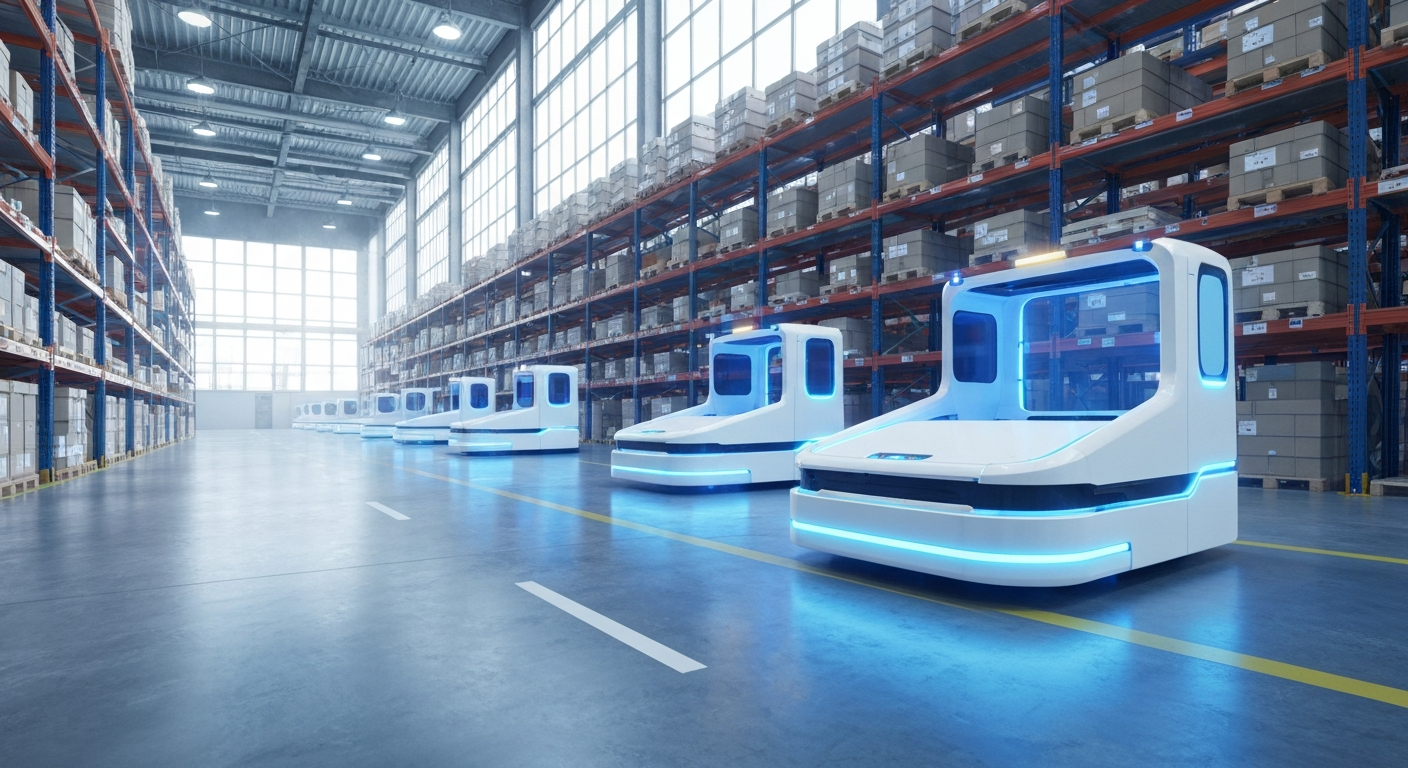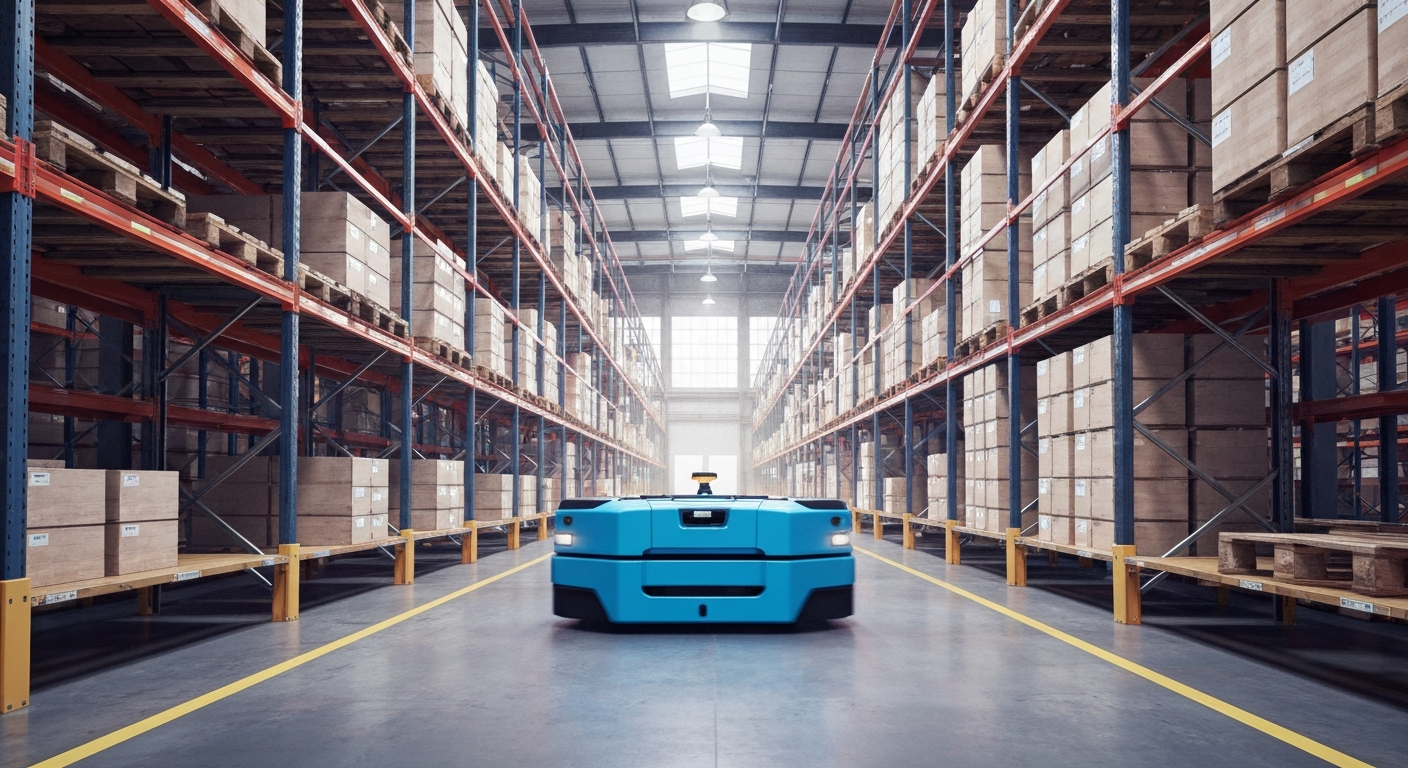How Is Industry 4.0 Changing the World?
How Is Industry 4.0 Changing the World?
Industry 4. 0, often referred to as the Fourth Industrial Revolution, is a term that encapsulates the integration of advanced digital technologies into various industries with the goal of revolutionizing traditional manufacturing and production methods. This transformative concept encompasses a wide range of cutting-edge advancements such as automation, artificial intelligence (AI), machine learning, internet of things (IoT), cloud computing, and data exchange analytics. These technologies work in synergy to enable smarter and more efficient processes, enhance productivity, optimize supply chains, and facilitate data-driven decision making. The integration of Industry 4. 0 technologies holds tremendous potential for businesses across sectors as it can lead to improved operational efficiency, cost reduction, enhanced product quality, and increased competitiveness in the global market. As organizations embrace the possibilities offered by Industry 4. 0, they are poised to unlock new opportunities for innovation and drive significant growth in today's rapidly evolving digital landscape.

What does Industry 4.0 Mean in Supply Chain?
In the field of supply chain management, Industry 4. 0 brings about a paradigm shift in the way products are manufactured, distributed, and delivered. This revolutionary concept leverages advanced technologies such as Internet of Things (IoT), artificial intelligence (AI), and big data analytics to drive significant improvements across the supply chain. One of the key advantages that Industry 4. 0 offers is real-time tracking and monitoring of inventory levels. This allows companies to have up-to-the-minute visibility into their stock, ensuring better inventory management and reducing the risk of stockouts or excess inventory. Moreover, Industry 4. 0 streamlines logistics operations through predictive analytics and optimization algorithms. By analyzing vast amounts of data in real-time, these advanced tools can forecast demand patterns, optimize routes for delivery vehicles, minimize transportation costs, and ultimately enhance overall operational efficiency. Another noteworthy feature of Industry 4. 0 is its ability to facilitate seamless communication between suppliers, manufacturers, and customers. With interconnected systems and IoT devices integrated into the supply chain network, stakeholders can easily exchange information on order status updates, production schedules, quality control metrics, and more. This open line of communication leads to improved collaboration among all parties involved in the supply chain ecosystem. Overall, Industry 4. 0 represents a transformative era in supply chain management by harnessing cutting-edge technologies to revolutionize traditional practices. Its implementation enables businesses to achieve higher levels of operational effectiveness while meeting customer demands with greater precision and agility.
What are the 4 Types of Industry?
In the realm of industry classification, it is important to distinguish between four distinct types or stages. The primary industry involves the extraction of raw materials, while the secondary industry focuses on manufacturing processes. Tertiary industry encompasses a wide range of services, and finally, quaternary industry refers to knowledge-based services. However, with the advent of Industry 4.0, all these sectors are experiencing a significant impact. This latest industrial revolution has introduced cutting-edge technologies that aim to enhance productivity and efficiency and support new business models across various industries. By leveraging advancements like automation, data analytics, artificial intelligence (AI), and Internet of Things (IoT), companies can streamline their operations and achieve higher levels of output. In primary industries such as mining or agriculture, AI-powered systems can be utilized to optimize resource extraction techniques, improve yield prediction models, and enhance safety protocols.
Similarly in secondary industries like manufacturing plants or assembly lines, advanced robotics and AI-driven systems, including generative AI, can assist in streamlining production processes by reducing errors and increasing overall efficiency. For example, automotive manufacturers use Industry 4.0 technologies to implement smart sensors and automated quality control on their assembly lines, while electronics producers can use AI-powered robots for precise component placement and machine maintenance predictions. The tertiary sector also stands to benefit greatly from Industry 4.0 technologies. Service-based businesses can leverage AI chatbots for customer support services or utilize big data analytics to gain insights into consumer behavior patterns. For instance, retail companies use real-time inventory tracking and personalized recommendation engines powered by Industry 4.0 to enhance the shopping experience, and hospitals incorporate IoT device monitoring to improve patient care.
Furthermore, with the integration of IoT devices into service-oriented environments such as smart cities or healthcare facilities, operational optimization becomes more achievable than ever before. Last but not least is the quaternary sector which heavily relies on knowledge-intensive activities - here too Industry 4.0 brings transformative changes. By harnessing AI algorithms for data analysis or using machine learning algorithms for predictive modeling in research-based organizations and consultancy firms alike can significantly enhance decision-making processes. A common example is financial firms using advanced machine learning for risk assessment and market trend predictions. To sum up, Industry 4.0 presents an unprecedented opportunity for all sectors involved in industrial classification by introducing innovative technologies that drive productivity gains and bolster operational efficiencies across the board.
Industry 4.0 Benefits
The benefits of Industry 4.0 and the industrial internet of things are immense and have the potential to revolutionize various industries. One of the significant advantages is its ability to enhance operational efficiency through cutting-edge technologies such as predictive maintenance systems and real-time data analysis. By continuously monitoring equipment performance, companies can proactively address maintenance issues, reducing downtime and minimizing costly repairs. In addition, Industry 4.0 enables personalized mass production by leveraging flexible manufacturing systems that can swiftly adapt to changing customer demands. This level of agility allows businesses to meet individual customer preferences without compromising on production efficiency or quality. Furthermore, automated quality control mechanisms play a vital role in Industry 4.0, ensuring consistent product quality throughout the production process. With advanced technologies, organizations can write real-time and take immediate corrective actions, thereby minimizing waste and improving overall product quality. Overall, embracing Industry 4.0 and the industrial internet of things offers a wide range of benefits for businesses across sectors, including improved operational efficiency, personalized mass production capabilities, and enhanced product quality through automated quality control mechanisms.
What is Industry 4.0
In summary, Industry 4.0 is a term that encapsulates the profound transformation taking place in various industries. This revolution is driven by the integration and application of advanced technologies, such as information technology, artificial intelligence, internet of things (IoT), machine learning, and big data analytics. The primary goal of Industry 4.0 is to enhance productivity, efficiency, flexibility, and innovation across sectors like manufacturing and supply chain management. By leveraging these cutting-edge technologies, businesses can automate processes, enable real-time data analysis for informed decision-making, optimize operations through predictive maintenance and intelligent inventory management systems. This shift towards Industry 4.0 has the potential to revolutionize traditional manufacturing practices by creating smart factories that are interconnected and capable of autonomous decision-making. Moreover, the implementation of Industry 4.0 principles can lead to improved overall equipment effectiveness (OEE), reduced downtime due to proactive maintenance measures, enhanced product quality through advanced quality control systems, and increased customization capabilities to meet individual customer demands effectively. It is crucial for companies to embrace this transformative wave brought by Industry 4.0 in order to stay competitive in today's rapidly evolving market landscape. By adapting their business models and processes to harness the power of these emerging technologies effectively, organizations can unlock new opportunities for growth while streamlining operations and delivering value-added products or services to their customers.
Evolution of Industry 4.0
The evolution of Industry 4.0 marks a significant turning point in the industrial landscape, characterized by the integration of digital technologies that reshape how industries operate. This evolution began with the First Industrial Revolution, which transitioned from manual labor to machine-based manufacturing, powered by steam and water. The Second Industrial Revolution introduced assembly lines and electricity, enhancing production efficiency. Following this, the Third Industrial Revolution leveraged digital technologies, integrating computers and automation into manufacturing processes. Today, the Fourth Industrial Revolution, or Industry 4.0, builds upon these foundations by incorporating advanced technologies such as artificial intelligence, the Internet of Things, big data analytics, and digital twins, enabling unprecedented levels of connectivity and automation.
As we move further into the era of Industry 4.0, we witness a convergence of the physical, digital, and biological worlds. This digital transformation is not merely technological; it represents a holistic change in how businesses function, from production to supply chain management. The ability to analyze vast amounts of data in real-time allows organizations to optimize operations, improve decision-making, and create customized solutions that meet the evolving needs of consumers. Thus, the evolution of Industry 4.0 signifies a profound shift toward smarter, more efficient, and more interconnected industrial practices.
First Industrial Revolution
The First Industrial Revolution, spanning from around 1760 to 1840, was a pivotal period that marked the shift from agrarian economies to industrialized societies. This revolution was primarily characterized by the introduction of steam power and water power, which facilitated the mechanization of production processes. The textile industry was one of the earliest adopters of these technologies, leading to significant advancements in cotton spinning and weaving. The use of steam power and steam engines not only revolutionized manufacturing but also transformed transportation with the advent of railways and steamships, enabling goods to be moved faster and more efficiently than ever before.
This era also saw the rise of mass production techniques, which allowed for the efficient production of goods at scale within the manufacturing industry. Factories emerged as central hubs of economic activity, drawing workers from rural areas into urban centers, thus fostering the growth of a new industrial working class. The societal impacts of the First Industrial Revolution were profound, leading to urbanization, the rise of a middle class, and significant changes in labor practices. While it laid the groundwork for future industrial advancements, it also introduced challenges such as labor exploitation and environmental degradation, shaping the discourse around industrial reform in the years to come.
Second Industrial Revolution
The Second Industrial Revolution, often referred to as the Technological Revolution, occurred between 1871 and 1914, marking a period of rapid industrial growth fueled by advancements in technology since the first industrial revolution. This era was distinguished by the widespread adoption of electricity, which transformed industries and households alike. The introduction of the assembly line, pioneered by figures such as Henry Ford, revolutionized manufacturing processes by enabling mass production of goods with increased efficiency. This innovation drastically reduced production times and costs, making products more accessible to the general public.
Information technology began to play a crucial role during this phase, facilitating communication and coordination across vast distances. The expansion of railroads and telegraph networks allowed for faster transfer of people, goods, and ideas, effectively shrinking the world. These developments not only transformed how businesses operated but also altered social dynamics, as new labor markets emerged and economic opportunities expanded. The Second Industrial Revolution laid the foundation for the modern economic landscape, leading to further technological advancements and setting the stage for the subsequent Third Industrial Revolution, which would further innovate industry through automation and data analysis.
Third Industrial Revolution
The Third Industrial Revolution, commonly known as the Digital Revolution, began in the late 20th century and is characterized by the shift from mechanical and analog technologies to digital technologies. This digital revolution was marked by the advent of computers, the Internet, and advanced telecommunications, which fundamentally changed how information was processed and shared. Businesses increasingly adopted digital tools, leading to automation in manufacturing and service industries, thereby enhancing productivity and efficiency.
Digital technologies facilitated the collection and analysis of data, enabling more informed decision-making through advanced analytics. The introduction of programmable logic controllers (PLCs) in manufacturing equipment allowed for automation in processes that were previously manual, paving the way for smart factories. This era also saw the rise of information technology as a critical component of business strategy, influencing everything from marketing to supply chain management. The Third Industrial Revolution set the stage for the current era, where the integration of digital technologies continues to reshape industries worldwide.
Fourth Industrial Revolution
The Fourth Industrial Revolution, or Industry 4.0, represents a profound transformation in the way industries operate, characterized by the integration of cyber-physical systems and physical systems, the Internet of Things (IoT), and artificial intelligence. This revolution, which began around 2011, emphasizes the connectivity of machines and systems, enabling real-time data exchange and analysis. As a result, businesses can achieve unprecedented levels of automation and efficiency, leading to smarter factories and optimized production processes.
Industry 4.0 is distinguished by its focus on cognitive computing, where machines not only perform tasks but also learn from data to make autonomous decisions. This shift enables industries to enhance operational efficiency, reduce downtime through predictive maintenance, and improve product quality through real-time monitoring and control, ultimately driving efficient product development. The Fourth Industrial Revolution is not just a technological shift; it also encompasses social and economic changes, as it challenges traditional business models and requires organizations to adapt to rapidly evolving consumer demands. The integration of advanced technologies in this era promises to revolutionize industries, making them more responsive, agile, and sustainable.
Fifth Industrial Revolution
The Fifth Industrial Revolution is anticipated to build upon the advancements of Industry 4.0, focusing on the collaboration between humans and machines, including applications of quantum computing. This emerging phase emphasizes the importance of human skills and creativity in the face of increasing automation. As industries continue to integrate advanced technologies, the need for new skills becomes paramount. Workers will require training and education to effectively collaborate with intelligent systems and leverage their capabilities.
In this new era, the emphasis shifts toward sustainability and the well-being of society, promoting practices that prioritize environmental responsibility and social equity. The Fifth Industrial Revolution, aligned with smart manufacturing principles, posits that technology should serve humanity, enhancing the quality of life rather than merely driving productivity. By fostering innovation and creativity, this revolution aims to create an inclusive economy where human insight and technological advancements work hand in hand to address complex global challenges. As we look to the future, the focus on developing new skills and fostering collaboration will be crucial for navigating the transformative landscape of the Fifth Industrial Revolution.
Characteristics of Industry 4.0
Industry 4.0 is defined by several key characteristics that distinguish it from previous industrial revolutions. Central to this paradigm shift is the integration of advanced technologies such as artificial intelligence, the Internet of Things (IoT), and big data analytics. These technologies enable real-time data exchange and communication between machines, leading to enhanced operational efficiency and decision-making. Moreover, the use of smart sensors allows for continuous monitoring of production processes, enabling proactive maintenance and minimizing downtime through the deployment of smart sensors.
Another hallmark of Industry 4.0 is the concept of digital twins, which create virtual representations of physical assets. This technology, combined with additive manufacturing, enables businesses to simulate processes, predict outcomes, and optimize operations before implementing changes in the physical world. Additionally, the emphasis on decentralized decision-making allows machines and systems to operate autonomously, responding to real-time data without human intervention. Overall, these characteristics contribute to the creation of smart factories that are agile, efficient, and capable of meeting the ever-changing demands of the market.
Key Components and Technologies
Industry 4.0 is supported by several key components and technologies that are integral to its successful implementation. These include:
- Cloud Computing: Provides scalable resources and data storage, enabling easy access to information and applications from anywhere.
- Industrial Internet of Things (IIoT): Refers to the network of connected devices that communicate and share data, improving visibility and control over manufacturing processes.
- Edge Computing: Processes data closer to the source, reducing latency and bandwidth usage, which is crucial for real-time decision-making.
- Artificial Intelligence (AI): Enhances automation by enabling machines to learn from data, make predictions, and optimize operations.
- Big Data Analytics: Analyzes vast amounts of data generated by connected devices to extract insights that inform business strategies.
Together, these components form the backbone of Industry 4.0, driving innovation and enabling organizations to adapt to the complexities of the modern industrial landscape.
Major Challenges Facing Industry 4.0
While Industry 4.0 offers numerous benefits, it also presents significant challenges, including the integration of cognitive computing, that organizations must address to fully realize its potential. One of the primary economic challenges is the need for substantial investment in technology and infrastructure. Companies may struggle with the high costs associated with upgrading systems and training employees, which can hinder their ability to adopt Industry 4.0 practices effectively.
Social challenges also arise, including the potential for job displacement as automation replaces traditional roles. This necessitates a focus on reskilling and upskilling the workforce to equip employees with the necessary skills to thrive in an increasingly automated environment. Additionally, organizational challenges such as resistance to change and the need for cultural shifts within companies can impede the successful implementation of Industry 4.0 initiatives. Addressing these challenges is crucial for organizations to navigate the transition and harness the transformative power of Industry 4.0.
Economic Challenges
Economic challenges associated with Industry 4.0 primarily revolve around the financial implications of technological investments in new products. Companies face the burden of high costs when upgrading machinery, implementing new software systems, and training their workforce to adapt to advanced technologies. The uncertain economic benefits can deter organizations from committing to these investments, as they may struggle to quantify the return on investment.
Additionally, the rapid pace of technological change on the factory floor can create a competitive disadvantage for businesses that are unable to keep up. Firms that fail to adopt Industry 4.0 technologies may find themselves losing market share to more innovative competitors, leading to increased pressure to invest in digital transformation. As a result, organizations must develop strategic financial plans to navigate these economic challenges and ensure they remain competitive in the evolving landscape of Industry 4.0.
Social Challenges
The social challenges posed by Industry 4.0 are multifaceted, primarily focusing on workforce adaptation and societal implications. One significant concern is the potential for job displacement due to increasing automation. As machines take over repetitive tasks, workers may face redundancy, particularly in low-skilled roles. This creates a pressing need for reskilling and upskilling initiatives to prepare employees for new positions that require new skills and different skill sets.
Furthermore, the rapid technological advancements can lead to a digital divide, where certain segments of the population may lack access to the necessary training and resources to thrive in a technology-driven workplace. This disparity can exacerbate existing social inequalities and hinder overall economic growth, which is crucial for the future of manufacturing. Addressing these social challenges requires collaborative efforts between governments, educational institutions, and businesses to create inclusive pathways for workforce development in the context of Industry 4.0.
Political Challenges
Political challenges related to Industry 4.0 primarily stem from the need for regulatory frameworks that keep pace with technological advancements. The German government, along with other governments, must establish clear guidelines and standards to ensure data security, privacy, and ethical considerations in the deployment of advanced technologies. The lack of regulation can create uncertainty for businesses, making them hesitant to invest in Industry 4.0 initiatives.
Moreover, political discourse around issues such as employment, data governance, and technological sovereignty can influence public perception and acceptance of Industry 4.0 technologies, including autonomous vehicles. Policymakers must engage with industry stakeholders to develop comprehensive strategies that foster innovation while addressing concerns related to job displacement and economic inequality. Ensuring a balanced approach to technological governance is essential for maximizing the benefits of Industry 4.0 while minimizing potential risks.
Organizational Challenges
Organizational challenges in the context of Industry 4.0 and the manufacturing sector revolve around the need for cultural transformation and operational adjustments. Many companies face resistance to change from employees who may be wary of new technologies and the potential disruption to established workflows. Overcoming this resistance requires effective change management strategies that involve clear communication and employee engagement in the transition process.
Additionally, organizations must address the need for a skilled workforce capable of leveraging advanced technologies and understanding key use cases. The current skills gap poses a significant barrier to successful implementation, as many employees may lack the necessary expertise in areas such as data analytics, AI, and IoT. Companies must invest in training and development programs to equip their workforce with the skills required for Industry 4.0. Furthermore, ensuring the integrity of production processes and maintaining cybersecurity are critical organizational challenges that must be prioritized to safeguard against potential disruptions in the digital landscape.
IIot / Industry 4.0 - attention-hungry money grab or the future?
Industry 4.0 represents a transformative shift towards automation and data exchange in manufacturing. While some view it skeptically as a money grab, its potential for increased efficiency, innovation, and connectivity suggests that it is indeed the future. Embracing IIoT can lead to significant advancements across industries.
The Broader Impact of Industry 4.0 Beyond Technology (Societal, Economic, and Global Shifts)
Industry 4.0, often referred to as the fourth industrial revolution, represents a paradigm shift not only in how industries leverage advanced technologies like artificial intelligence, the Internet of Things (IoT), robotics, and big data but also in its far-reaching impact on society, the global economy, and international relations.
Societal Impact:
Industry 4.0 is transforming the workplace and redefining the nature of employment. Automation and smart manufacturing are reducing the need for repetitive manual labor, which can lead to job displacement in certain sectors. However, this evolution also creates opportunities for upskilling and new professions focused on technology management, data analytics, cybersecurity, and process optimization. The demand for digital literacy and lifelong learning is growing rapidly. Furthermore, Industry 4.0 enables greater flexibility in work environments—such as remote monitoring of processes—supporting trends like telecommuting and decentralized teams. On a broader level, it enhances product customization and personalizes consumer experiences through data-driven insights.
Economic Impact:
From an economic perspective, Industry 4.0 drives increased productivity and efficiency by optimizing supply chains and production processes with real-time data analysis. This leads to reduced operational costs and faster time-to-market for new products. Businesses adopting these technologies gain a competitive edge through innovation and agility. At the same time, Industry 4.0 is fostering the rise of new markets centered around smart devices, digital platforms, and cloud-based services. Small- and medium-sized enterprises (SMEs) can access sophisticated tools that were previously available only to large corporations, democratizing innovation across industries.
Global Shifts:
The influence of Industry 4.0 extends well beyond national borders—it is reshaping global trade patterns by enabling more efficient logistics networks and transparent supply chains via blockchain technology. Countries are compelled to invest in digital infrastructure to stay competitive in the global marketplace or risk falling behind technologically advanced economies. The rapid diffusion of smart factories worldwide may intensify competition but also opens doors for international collaboration through interconnected manufacturing ecosystems.
Additionally, Industry 4.0 brings forth important challenges related to cybersecurity risks due to increased connectivity among devices; ethical considerations surrounding AI decision-making; concerns over privacy; and questions about equitable access to technological advancements across different regions.
In summary, while Industry 4.0 is fundamentally altering how businesses operate through technological innovation, its broader impact touches every aspect of society—from workforce transformation to economic development—and continues to shape global dynamics by fostering interconnectedness while presenting new challenges that require



